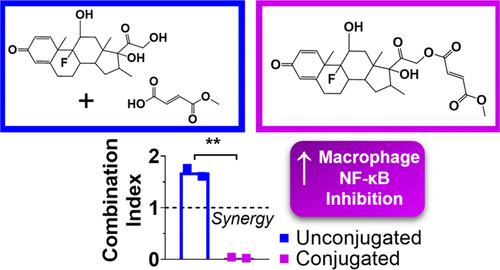当前位置:
X-MOL 学术
›
Bioconjugate Chem.
›
论文详情
Our official English website, www.x-mol.net, welcomes your
feedback! (Note: you will need to create a separate account there.)
Dexamethasone and Fumaric Acid Ester Conjugate Synergistically Inhibits Inflammation and NF-κB in Macrophages
Bioconjugate Chemistry ( IF 4.0 ) Pub Date : 2021-06-24 , DOI: 10.1021/acs.bioconjchem.1c00200 Christopher J Genito 1 , Meital Eckshtain-Levi 2 , Zayda L Piedra-Quintero 3 , Sai Archana Krovi 2 , Abriana Kroboth 3 , Rebeca T Stiepel 2 , Mireia Guerau-de-Arellano 3 , Eric M Bachelder 2 , Kristy M Ainslie 1, 2, 4
Bioconjugate Chemistry ( IF 4.0 ) Pub Date : 2021-06-24 , DOI: 10.1021/acs.bioconjchem.1c00200 Christopher J Genito 1 , Meital Eckshtain-Levi 2 , Zayda L Piedra-Quintero 3 , Sai Archana Krovi 2 , Abriana Kroboth 3 , Rebeca T Stiepel 2 , Mireia Guerau-de-Arellano 3 , Eric M Bachelder 2 , Kristy M Ainslie 1, 2, 4
Affiliation

|
Macrophage-mediated inflammation drives autoimmune and chronic inflammatory diseases. Treatment with anti-inflammatory agents can be an effective strategy to reduce this inflammation; however, high concentrations of these agents can have immune-dampening and other serious side effects. Synergistic combination of anti-inflammatory agents can mitigate dosing by requiring less drug. Multiple anti-inflammatory agents were evaluated in combination for synergistic inhibition of macrophage inflammation. The most potent synergy was observed between dexamethasone (DXM) and fumaric acid esters (e.g., monomethyl fumarate (MMF)). Furthermore, this combination was found to synergistically inhibit inflammatory nuclear factor κB (NF-κB) transcription factor activity. The optimal ratio for synergy was determined to be 1:1, and DXM and MMF were conjugated by esterification at this molar ratio. The DXM–MMF conjugate displayed improved inhibition of inflammation over the unconjugated combination in both murine and human macrophages. In the treatment of human donor monocyte-derived macrophages, the combination of DXM and MMF significantly inhibited inflammatory gene expression downstream of NF-κB and overall performed better than either agent alone. Further, the DXM–MMF conjugate significantly inhibited expression of NOD-, LRR-, and pyrin domain-containing protein 3 (NLRP3) inflammasome-associated genes. The potent anti-inflammatory activity of the DXM–MMF conjugate in human macrophages indicates that it may have benefits in the treatment of autoimmune and inflammatory diseases.
中文翻译:

地塞米松和富马酸酯缀合物协同抑制巨噬细胞中的炎症和 NF-κB
巨噬细胞介导的炎症会导致自身免疫性疾病和慢性炎症性疾病。使用抗炎药物治疗可能是减轻这种炎症的有效策略;然而,高浓度的这些药物可能会产生免疫抑制和其他严重的副作用。抗炎药的协同组合可以通过减少药物用量来减轻剂量。评估多种抗炎药联合使用对巨噬细胞炎症的协同抑制作用。在地塞米松 (DXM) 和富马酸酯(例如富马酸单甲酯 (MMF))之间观察到最有效的协同作用。此外,这种组合被发现可以协同抑制炎症核因子 κB (NF-κB) 转录因子的活性。确定协同作用的最佳比例为1:1,DXM和MMF在此摩尔比下通过酯化反应进行缀合。与未缀合的组合相比,DXM-MMF 缀合物在小鼠和人类巨噬细胞中显示出更好的炎症抑制作用。在人类供体单核细胞来源的巨噬细胞的治疗中,DXM 和 MMF 的组合显着抑制了 NF-κB 下游的炎症基因表达,总体效果比单独使用任何一种药物都要好。此外,DXM-MMF 缀合物显着抑制 NOD、LRR 和 Pyrin 结构域蛋白 3 (NLRP3) 炎性体相关基因的表达。DXM-MMF 缀合物在人类巨噬细胞中的有效抗炎活性表明它可能有助于治疗自身免疫性疾病和炎症性疾病。
更新日期:2021-08-19
中文翻译:

地塞米松和富马酸酯缀合物协同抑制巨噬细胞中的炎症和 NF-κB
巨噬细胞介导的炎症会导致自身免疫性疾病和慢性炎症性疾病。使用抗炎药物治疗可能是减轻这种炎症的有效策略;然而,高浓度的这些药物可能会产生免疫抑制和其他严重的副作用。抗炎药的协同组合可以通过减少药物用量来减轻剂量。评估多种抗炎药联合使用对巨噬细胞炎症的协同抑制作用。在地塞米松 (DXM) 和富马酸酯(例如富马酸单甲酯 (MMF))之间观察到最有效的协同作用。此外,这种组合被发现可以协同抑制炎症核因子 κB (NF-κB) 转录因子的活性。确定协同作用的最佳比例为1:1,DXM和MMF在此摩尔比下通过酯化反应进行缀合。与未缀合的组合相比,DXM-MMF 缀合物在小鼠和人类巨噬细胞中显示出更好的炎症抑制作用。在人类供体单核细胞来源的巨噬细胞的治疗中,DXM 和 MMF 的组合显着抑制了 NF-κB 下游的炎症基因表达,总体效果比单独使用任何一种药物都要好。此外,DXM-MMF 缀合物显着抑制 NOD、LRR 和 Pyrin 结构域蛋白 3 (NLRP3) 炎性体相关基因的表达。DXM-MMF 缀合物在人类巨噬细胞中的有效抗炎活性表明它可能有助于治疗自身免疫性疾病和炎症性疾病。











































 京公网安备 11010802027423号
京公网安备 11010802027423号